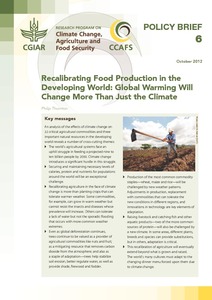Nile Basin farming systems and productivity
Options to enhance the impact of AKST on development and sustainability goals
Proceedings of the CPWF, GBDC, WLE Conference on Revitalizing the Ganges Coastal Zone: Turning Science into Policy and Practices, Dhaka, Bangladesh, 21-23 October 2015
Productivity and the poor?: political economy of village pond fishery in the Indo-Gangetic Basin
India’s 2.25 million ha of village tanks were for centuries loosely managed as multiple use common property resources, including for fishing by artisanal fisher-folk, the lowest in the social hierarchy. During the 1970s and after, the aquaculture productivity revolution created a vibrant new political economy by increasing manyfold the value of fishing rights in these tanks. This productivity boom was expected to improve the lot of poor artisanal fisher communities. But has this happened?
Recalibrating Food Production in the Developing World: Global Warming Will Change More Than Just the Climate
An analysis of the effects of climate change on 22 critical agricultural commodities and three important natural resources in the developing world reveals a number of cross-cutting themes: The world’s agricultural systems face an uphill struggle in feeding a projected nine to ten billion people by 2050. Climate change introduces a significant hurdle in this struggle.
- Securing and maintaining necessary levels of calories, protein and nutrients for populations around the world will be an exceptional challenge.


